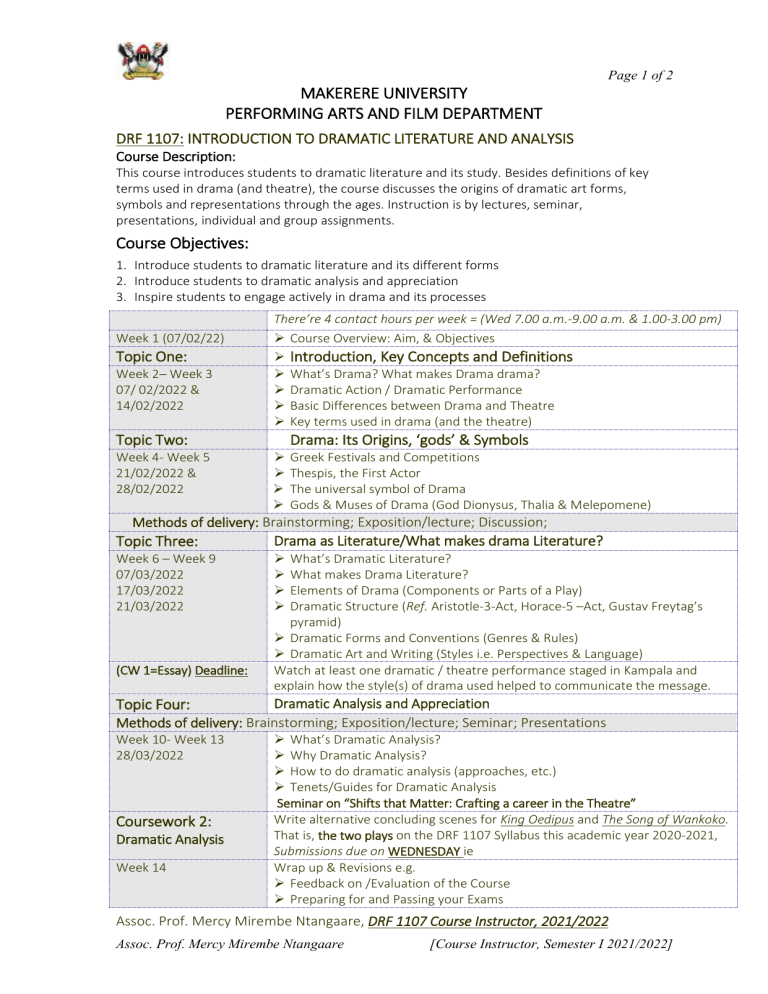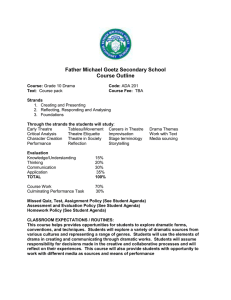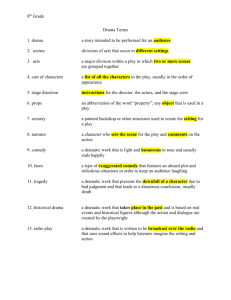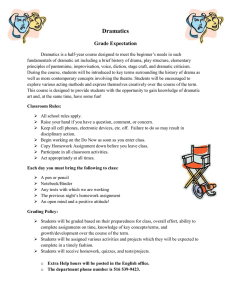
Page 1 of 2 MAKERERE UNIVERSITY PERFORMING ARTS AND FILM DEPARTMENT DRF 1107: INTRODUCTION TO DRAMATIC LITERATURE AND ANALYSIS Course Description: This course introduces students to dramatic literature and its study. Besides definitions of key terms used in drama (and theatre), the course discusses the origins of dramatic art forms, symbols and representations through the ages. Instruction is by lectures, seminar, presentations, individual and group assignments. Course Objectives: 1. Introduce students to dramatic literature and its different forms 2. Introduce students to dramatic analysis and appreciation 3. Inspire students to engage actively in drama and its processes Week 1 (07/02/22) Topic One: Week 2– Week 3 07/ 02/2022 & 14/02/2022 There’re 4 contact hours per week = (Wed 7.00 a.m.-9.00 a.m. & 1.00-3.00 pm) Course Overview: Aim, & Objectives Introduction, Key Concepts and Definitions What’s Drama? What makes Drama drama? Dramatic Action / Dramatic Performance Basic Differences between Drama and Theatre Key terms used in drama (and the theatre) Topic Two: Week 4- Week 5 21/02/2022 & 28/02/2022 Drama: Its Origins, ‘gods’ & Symbols Greek Festivals and Competitions Thespis, the First Actor The universal symbol of Drama Gods & Muses of Drama (God Dionysus, Thalia & Melepomene) Methods of delivery: Brainstorming; Exposition/lecture; Discussion; Drama as Literature/What makes drama Literature? Topic Three: Week 6 – Week 9 07/03/2022 17/03/2022 21/03/2022 (CW 1=Essay) Deadline: What’s Dramatic Literature? What makes Drama Literature? Elements of Drama (Components or Parts of a Play) Dramatic Structure (Ref. Aristotle-3-Act, Horace-5 –Act, Gustav Freytag’s pyramid) Dramatic Forms and Conventions (Genres & Rules) Dramatic Art and Writing (Styles i.e. Perspectives & Language) Watch at least one dramatic / theatre performance staged in Kampala and explain how the style(s) of drama used helped to communicate the message. Dramatic Analysis and Appreciation Methods of delivery: Brainstorming; Exposition/lecture; Seminar; Presentations Topic Four: Week 10- Week 13 28/03/2022 Coursework 2: Dramatic Analysis Week 14 What’s Dramatic Analysis? Why Dramatic Analysis? How to do dramatic analysis (approaches, etc.) Tenets/Guides for Dramatic Analysis Seminar on “Shifts that Matter: Crafting a career in the Theatre” Write alternative concluding scenes for King Oedipus and The Song of Wankoko. That is, the two plays on the DRF 1107 Syllabus this academic year 2020-2021, Submissions due on WEDNESDAY ie Wrap up & Revisions e.g. Feedback on /Evaluation of the Course Preparing for and Passing your Exams Assoc. Prof. Mercy Mirembe Ntangaare, DRF 1107 Course Instructor, 2021/2022 Assoc. Prof. Mercy Mirembe Ntangaare [Course Instructor, Semester I 2021/2022] Page 2 of 2 RECOMMENDED STUDY TEXTS: 1. Sophocles (429 BC) King Oedipus 2. Byron Kawadwa (1971) The Song of Wankoko NB: We’ll study two texts in detail in class: 1 from tragedy from Greek Drama (5th Century) and 1 comedy/musical from Uganda (20th Century) However, it’s beneficial for you to study drama texts and presentations from different periods of time as well as watching as many theatre productions as possible to appreciate the course’s content properly. READING LIST A: General References on Drama and Theatre 1. Oscar G. Brockett, The Theatre: An Introduction (4th Edition), Chicago: Holt, Reinhart & Winston, Inc., 1979 2. Oscar G. Brockett, History of the Theatre (5th Edition), Boston: Allyn & Bacon, Inc., 1987 3. Edwin Wilson, The Theatre Experience, New York: McGraw Hill Book Company, 1988 4. Kenneth M. Cameron & Patti P. Gillespie, The Enjoyment of Theatre (5th Edition), Boston: Allyn & Bacon, Inc., 2000 5. Robert Cohen, Theatre (9th Edition), New York: Mc Grow Hill Book Company, 2011 6. Louis E. Catron, Writing, Producing and Selling Your Play: Englewood Cliffs, N.J.: Prentice-Hall Trade, 1984 7. Mercy Mirembe Ntangaare & Susan Battye eds., Dance and Drama in Uganda (The Pearl of Africa), E-Book, 2003 B: References Specific to Dramatic Literature, Structure & Analysis 8. Brian Crow, Studying Drama, London: Longman, 1983 9. John Styan, The Elements of Drama, Cambridge: Cambridge University Press, 1990 10. Lajos N. Egri, The Art of Dramatic Writing, New York: Simon & Schuster, 1960 (also as an E-Book on the Internet) 11. Oscar Lee, Strategies of Drama: The Experience of Form, New York: Greenwood Press, 1991 12. T. S. Dorsch, Aristotle/Horace/Longinus: Classical Literary Criticism, Auckland: Penguin Books Ltd., 1961 13. Plato, The Republic (e-Book on Internet) C: Other References 14. Conversations with other Lecturers at PAF 15. Relevant Articles in newspapers and other journals 16. Search the Internet Assoc. Prof. Mercy Mirembe Ntangaare [Course Instructor, Semester I 2021/2022]


